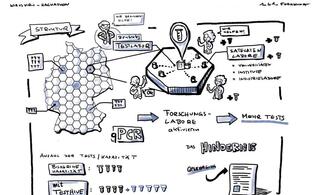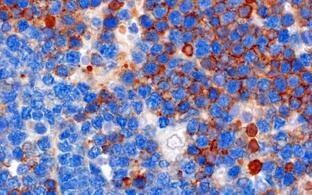Proteomics and Metabolomics
Stefan Kempa
Profile
We are a collaborative research and technology platform at the MDC working together with research & technology groups from MDC, partner institutes (Charité, BIH) and international partners.
Interactions between genes, proteins & metabolites define the cellular state. Studying the manifold molecular species and their interaction in the cell in a systematic, quantitative & time resolved manner enables a systems biochemistry view. Proteomics aims at the large-scale study of proteins, metabolomics is concerned with the intermediates and products of the biochemical network. Investigating the intertwined molecular network allows for a better understanding of metabolic regulation and its impact on processes such as cell differentiation, de-differentiation & cancer formation.
Cellular crosstalk in health and disease
The integrative proteomics and metabolomics research and technology platform is part of the Berlin Institute for Medical Systems Biology (BIMSB). We are a team of biologists, engineers, chemists, pharmacologists, and bioinformaticians who have established and apply a number of mass spectrometry-based proteomics and metabolomics methods that allow us to analyze the dynamics of metabolism under in vitro conditions and in vivo.
For proteomics studies, we apply mass-spectrometric techniques that either use stable isotopes for labeling proteins or that are label-free. We have also developed and patented a workflow called pulsed stable isotope-resolved metabolomics (pSIRM) that provides a dynamic, time-resolved quantitative measurement of the central metabolism in vitro and in vivo. We develop mass spectrometry based methods for clinical application in order to improve patient stratification, monitor treatment response and to investigate resistance mechanisms in cancer, cardiovascular and degenerative diseases.
Our group is interested in the crosstalk between metabolism and gene regulation during cellular differentiation & reprogramming & cancer formation. We are focusing on central metabolism, a set of core biochemical pathways that is highly flexible and continuously adjusted to the physiological programming – and reprogramming – of the cell.
Our tools
- Metabolite Profiling & Stable Isotope-Resolved Metabolomics
- Nucleotide & Nucleoside Profiling
- Lipid & Fatty Acid & Short Chain Fatty Acid & Bile Acid Profiling
- Proteomics
Team
Technology & Applications
Cellular Crosstalk In Health And Disease
The integrative proteomics and metabolomics research and technology platform is an integral part of the Berlin Institute for Medical Systems Biology. We are a team of biologists, engineers, chemists, pharmacologists, and bio-informaticians. In order to analyze the dynamics of metabolism under in vitro conditions and in living organisms, we have established a number of mass spectrometry-based proteomics and metabolomics methods. Using these techniques we are able to measure the metabolic activity of cells and organs in a dynamic manner in vitro and in vivo.
- Metabolomics And Proteomics Methods
The different mass spectrometric platforms that are established within our group allow the quantitative measurement of a broad spectrum of biomolecules - this setup offers a high flexibility for the establishment and the further development of metabolomics and proteomics techniques.
The analysis of metabolites and proteins is crucial to determine the metabolic network of cells and organs. Although transcript levels contain basic information about the metabolic settings, transcriptional studies will never be sufficient to describe the metabolic state. Because the regulation of metabolism appears at all biological layers: (post-) transcriptional, (post-) translational and on an allosteric level.
Our group established cutting edge mass spectrometry-based metabolomics and proteomics techniques to analyze cell cultures, organs and whole organisms. Proteomic techniques combined with stable isotope labelling as SILAC (stable isotope labelling of amino acids in cell culture) are used for quantitative proteome analyses. Gas chromatography coupled mass spectrometry (GC-MS) as well as liquid chromatography coupled mass spectrometry (LC-MS) based techniques are applied to monitor the metabolome. In addition, we have developed pulsed stable isotope resolved metabolomics (pSIRM) as a tool for a dynamic metabolic characterization of cellular metabolism. We use both strategies for lipidome analyses (I) direct infusion parent ion scan and neutral loss scan methods and (II) direct infusion high resolution applications.
Metabolic profiling
Metabolic profiling (free fatty acid profiling) is an untargeted GC-MS based method that allows the quantitative analysis of a broad spectrum of small molecules. Using commercial and in house data analysis tools large data sets can be established as basis for downstream statistical and bioinformatics analyses.
pSIRM (Pulsed Stable Isotope Resolved Metabolomics)
pSIRM is an in house established and patented workflow that enables a quantitative and time resolved analysis of cellular metabolism. We have further developed the analysis of stable isotope incorporation in vivo (mouse models) and we have established methods that allow to decode the action of metabolic inhibitors.
- in vivo isotope tracing
- concurrent isotope tracing
- targeted stable isotope resolved metabolomics
Lipid analyses / Fatty Acid / Short Chain Fatty Acid / Bile Acid Profiling
Lipids are an important class of metabolites that are crucial as structural components of biological membranes, signaling molecules and energy source. Lipids comprise the largest number among all classes of metabolites. In order to comprehensively analyze the lipidome of biological materials powerful methods are required. We use liquid chromatography and gas chromatography based methods to quantitatively analyze the lipophilic compounds from cell, organs and organisms.
Nucleotide / Nucleoside Profiling
Nucleotides and nucleosides are an important class of molecules that are building blocks of nucleic acids, signaling molecules and energy equivalents. Of special interest is the composition analysis of DNA and RNA and to quantify modified nucleotide species. We use triple-quadrupol SRM based methods to determine the composition of RNA; novel mass spectrometry based high resolution methods are in preparation. The new established methods will allow to measure nucleotides / nucleosides in an unbiased way.
Proteomics
Various proteomics methods are available in our lab.
- label free proteomics
- stable isotope labeling in cell culture (SILAC)
- Phospho-Proteomics
- RedOx-Proteomics
Publications
News
Research & Technology
Research & Technology Projects
- Metabolic dynamics
Metabolic reprogramming occurs during differentiation of stem cells, regeneration, immune cell activation and also during oncogenic transformation. Using the established proteomics and metabolomics tools we aim to decode the molecular basis of such reprogramming events. The in-house developed methodology 'pulsed stable isotope resolved metabolomics' allows the dynamic analysis of cellular metabolic processes.
- Analyzing Mechanisms Of Chemotherapy Resistance
Cancer cells display a high metabolic activity allowing them to grow in a competitive manner inside the body. Those cells take advantage over neighboring cells by metabolizing faster the available resources, mainly glucose, glutamine and oxygen. An up-regulation of glycolysis and the resulting lactate formation of tumors was already observed and described nearly 90 years ago by Otto Heinrich Warburg. Warburg termed this effect ‘aerobic glycolysis’ because he observed lactate formation, a product of anaerobic metabolism, by tumor cells even in the presence of oxygen. The increased metabolic rates of cancer cells induce very fast a gradient of nutrient availability and produce an environment where glucose and oxygen become limiting. It is expectable that the cellular signaling and metabolic networks adjust to these conditions.
As part of the MASTARS consortium we analyze the metabolic aspects of (a) cis-platin resistance in solid tumors and (b) investigate the cellular adaptations of leukemic cells to asparaginase treatment. Resulting from conventional or personalized cancer treatment an induced resistance can frequently be observed. The analysis of resistant and treatment sensitive cancer cells showed that resistance comes with the cost of induced metabolic pathways, in future aim to explore if these treatment resistant metabolic states open novel therapeutic windows.
- Metabolic Alterations During Differentiation & Regeneration
The activity of the central metabolism provides the substrates for epigenetic modifications, defines the metabolic program and thus influences cellular signaling and the epigenetic state. We are investigating the crosstalk between metabolism and epigenetic changes. Our group develops applications that allow the analysis of metabolic - epigenetic interactions in a time resolved manner. We aim to understand if metabolic reprograming is a driver for epigenetic changes in various model systems and diseases. We also aim to further develop our methods and data integration workflows to allow us to apply proteomics and metabolomics techniques at the single-cell level and spatially resolved.
















